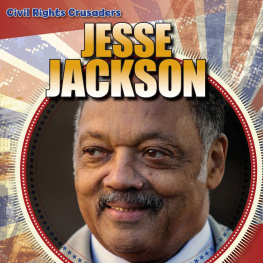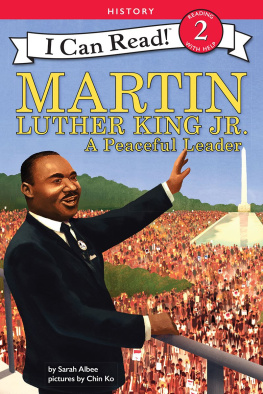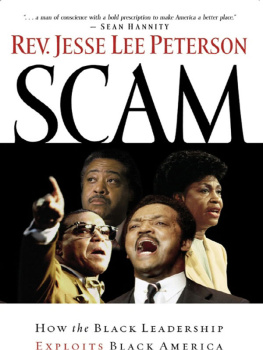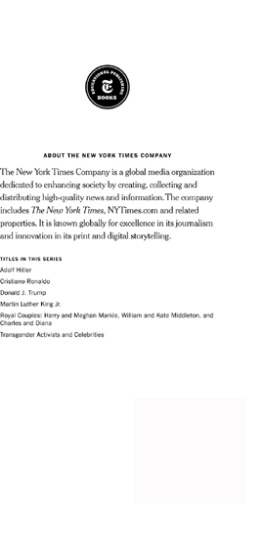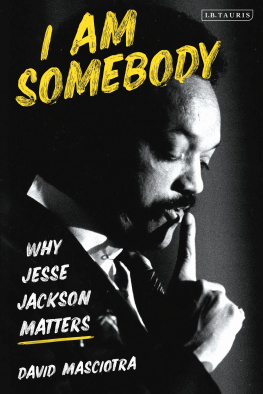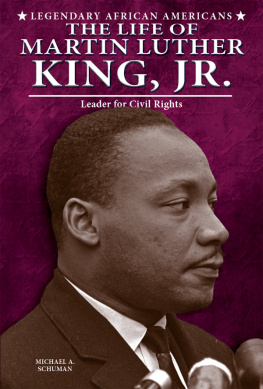THE GREAT LIVES SERIES
Great Lives biographies shed an exciting new light on the many dynamic men and women whose actions, visions, and dedication to an ideal have influenced the course of history. Their ambitions, dreams, successes, and failures, the controversies they faced and the obstacles they overcame are the true stories behind these distinguished world leaders, explorers, and great Americans.
Other biographies in the Great Lives Series
CHRISTOPHER COLUMBUS:The Intrepid Mariner
AMELIA EARHART:Challenging the Skies
THOMAS EDISON:Inventing the Future
MIKHAIL GORBACHEV:The Soviet Innovator
JOHN GLENN:Space Pioneer
JOHN F. KENNEDY:Courage in Crisis
MARTIN LUTHER KING:Dreams for a Nation
ABRAHAM LINCOLN:The Freedom President
SALLY RIDE:Shooting for the Stars
FRANKLIN D. ROOSEVELT:The Peoples President
HARRIET TUBMAN:Call to Freedom
For middle-school readers
A Fawcett Columbine Book
Published by Ballantine Books
Produced by
The Jeffrey Weiss Group, Inc.
96 Morton Street
New York, New York 10014
Copyright 1989 by The Jeffrey Weiss Group, Inc.
All rights reserved under International and Pan-American Copyright Conventions. Published in the United States by Ballantine Books, a division of Random House, Inc., New York, and simultaneously in Canada by Random House of Canada Limited, Toronto.
Library of Congress Catalog Card Number: 89-90905
eISBN: 978-0-307-77584-9
v3.1
ACKNOWLEDGMENT
A special thanks to educators Dr. Frank Moretti, Ph.D., Associate Headmaster of the Dalton School in New York City; Dr. Paul Mattingly, Ph.D., Professor of History at New York University; and Barbara Smith, M.S., Assistant Superintendent of the Los Angeles Unified School District, for their contributions to the Great Lives Series.
TABLE OF CONTENTS
Chapter 1
Keeping Hope Alive
Chapter 2
Growing Up in Greenville
Chapter 3
Football, Romance, and Civil Rights
Chapter 4
Working for the King
Chapter 5
The Big Push
Chapter 6
World Ambassador
Chapter 7
Change in Chicago
Chapter 8
Jesse for President!
Chapter 9
Conscience of a Nation
Chapter 10
Win, Jesse, Win!
Chapter 11
The Endless Campaign
Chapter 12
What Jesse Wants
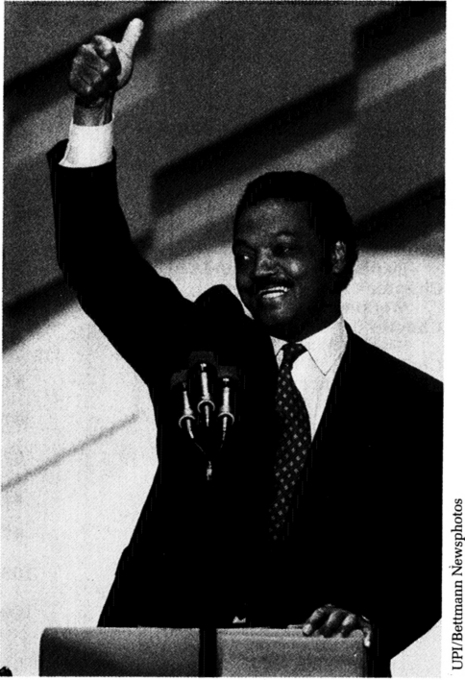
UPI/Bettmann Newsphotos
1
Keeping Hope Alive
I T WAS ANOTHER hot, sticky summer night in Atlanta, Georgia. But the heat was not the main thing on the minds of the several thousand people at the 1988 Democratic National Convention in the Omni Coliseum. They were waiting anxiously to hear the man who had dominated the Democratic race for president and had captured the imagination of millions of Americans. Everyone knew by now that this man would not be their candidate for president, but whether he would enthusiastically support the winning ticket was a matter of great concern. The man they were waiting for was Jesse Louis Jackson.
Jackson was not just another runner-up for the nomination. In a field of seven candidates, he was one of only two to survive the long, grueling round of state primaries. The seven million votes he had earned had not been enough to win the nomination. That prize was about to go to his chief rival, Massachusetts Governor Michael Dukakis. There had been high hopes that Dukakis would choose Jesse as his running mate, but he was passed over for vice president, too. Jesse had been disappointed by the way he felt Dukakiss campaign team had ignored him and his supporters. There had been a peace meeting between the two men the previous day, but there were still doubts in many peoples minds about how strongly Jackson would support Dukakis and his running mate, Senator Lloyd Bentsen of Texas. In another few minutes, the crowd in the Omni Coliseum, and the rest of America watching the convention on television, would know where Jesse Jackson stood.
The first Jackson to step out on the speakers rostrum, however, was neither the candidate nor his wife, but their five children. They spoke passionately about their father and his achievements. After a brief film about the candidate was shown, Jesse Jr., Jacksons eldest son, introduced a man who fights against the odds, who lives against the odds, our dad, Jesse Jackson.
Thunderous applause and cheering erupted throughout the hall as the six-foot-two, 200-pound candidate strode up to the rostrum. With his neat moustache, dark, piercing eyes, and strikingly handsome features, the 46-year-old Jackson looked as much a movie star as a presidential candidate. Chants of Jesse! Jesse! Jesse! filled the air. As the band played America the Beautiful and then The Stars and Stripes Forever, the tall black man mounted the podium and pumped his fist three times for victory.
Minutes passed before the crowd quieted down. Then Jesse Jackson did a gracious thing. Instead of launching into his speech, he introduced a frail, elderly black woman seated in the stands. She was Rosa Parks, and Jackson called her the mother of the Civil-Rights Movement. Some thirty years earlier, Rosa Parks had earned that title when she took a seat in the front of a segregated city bus in Montgomery, Alabama, and refused to move when the bus driver ordered her to give up her seat to a white person. She was arrested for breaking a local law that required blacks to sit in the back of public buses. Her arrest led to a yearlong boycott of Montgomery buses led by the then unknown Martin Luther King, Jr. King went on to become the leader of Americas Civil-Rights Movement. He was assassinated in 1968.
Mrs. Parks stood and acknowledged the crowds ovation. After she sat down again, Jesse began to speak to the delegates in loud, ringing words. Dr. Martin Luther King, Jr., lies only a few miles from us tonight, he began. Tonight he must feel good as he looks down upon us. We sit here together, a rainbow coalitionthe sons and daughters of slave-masters, and the sons and daughters of slavessitting together around a common table, to decide the direction of our party and our country.
Common ground! he exclaimed. Thats the challenge of our party tonight. Jackson spoke of unity not just within the Democratic party, but among all Americans, regardless of creed and color. Then he saluted Dukakis, the man who had beat him for the nomination. His foreparents came to America on immigrant ships. My foreparents came to America on slave ships. But whatever the original ships, we are in the same boat tonight.
America is not a blanket woven from one thread, one color, one cloth, he told his audience. He spoke of his childhood in Greenville, South Carolina, and how his grandmother made a patchwork quilt to keep him warm, because she couldnt afford a blanket.


